OCZ’s Vertex Limited Edition Review & SSD State of the Union
by Anand Lal Shimpi on February 19, 2010 12:00 AM EST- Posted in
- Storage
Overall System Performance using PCMark Vantage
Next up is PCMark Vantage, another system-wide performance suite. For those of you who aren’t familiar with PCMark Vantage, it ends up being the most real-world-like hard drive test I can come up with. It runs things like application launches, file searches, web browsing, contacts searching, video playback, photo editing and other completely mundane but real-world tasks. I’ve described the benchmark in great detail before but if you’d like to read up on what it does in particular, take a look at Futuremark’s whitepaper on the benchmark; it’s not perfect, but it’s good enough to be a member of a comprehensive storage benchmark suite. Any performance impacts here would most likely be reflected in the real world.
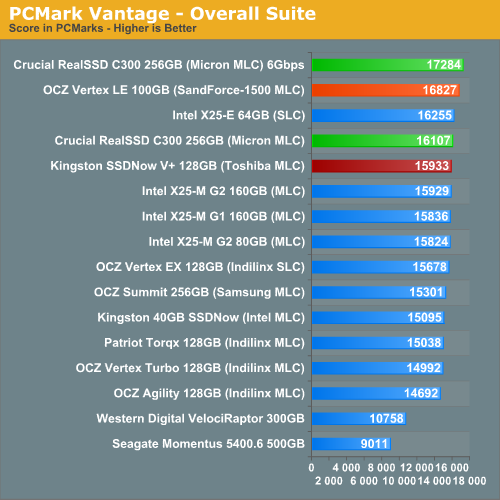
The performance differences under PCMark Vantage are minimal between any halfway decent SSDs. This actually mimicks what you'll see in most real world usage with these drives. It's the same reason I don't use individual application launch tests to compare performance - all of these drives perform about the same. The being said, the Vertex LE is technically the fastest 3Gbps drive here, behind only the C300 connected to a 6Gbps controller. The new Kingston drive does very well here.
The overall standings are something you'll see repeated in most of the subtests. Crucial and OCZ trading blows at the top, with the 6Gbps controller often giving Crucial the slight edge.
The memories suite includes a test involving importing pictures into Windows Photo Gallery and editing them, a fairly benign task that easily falls into the category of being very influenced by disk performance.
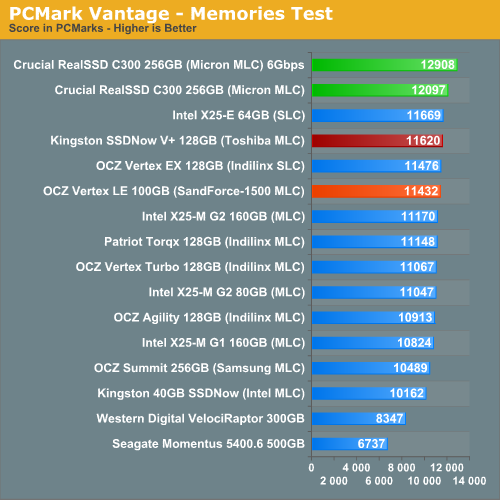
The TV and Movies tests focus on on video transcoding which is mostly CPU bound, but one of the tests involves Windows Media Center which tends to be disk bound.
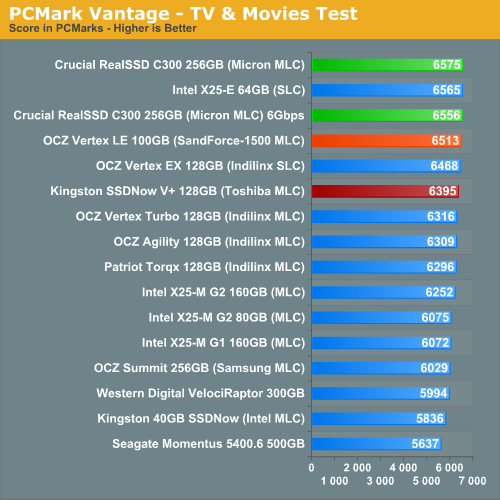
The gaming tests are very well suited to SSDs since they spend a good portion of their time focusing on reading textures and loading level data. All of the SSDs dominate here, but as you'll see later on in my gaming tests the benefits of an SSD really vary depending on the game. Take these results as a best case scenario of what can happen, not the norm.
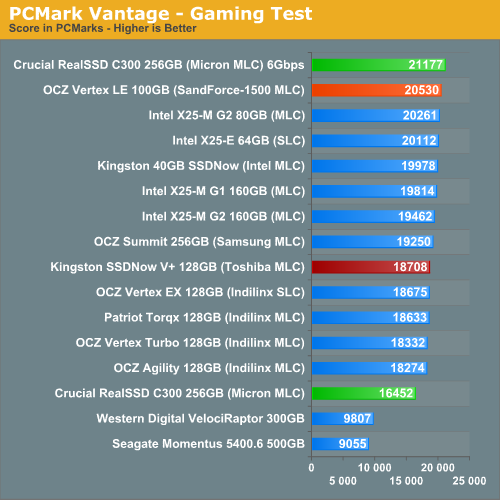
In the Music suite the main test is a multitasking scenario: the test simulates surfing the web in IE7, transcoding an audio file and adding music to Windows Media Player (the most disk intensive portion of the test).
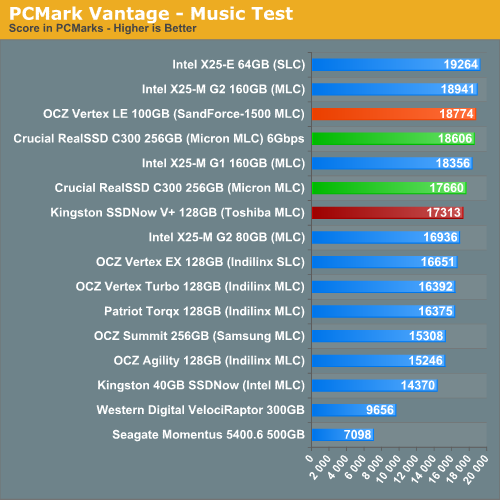
The Communications suite is made up of two tests, both involving light multitasking. The first test simulates data encryption/decryption while running message rules in Windows Mail. The second test simulates web surfing (including opening/closing tabs) in IE7, data decryption and running Windows Defender.
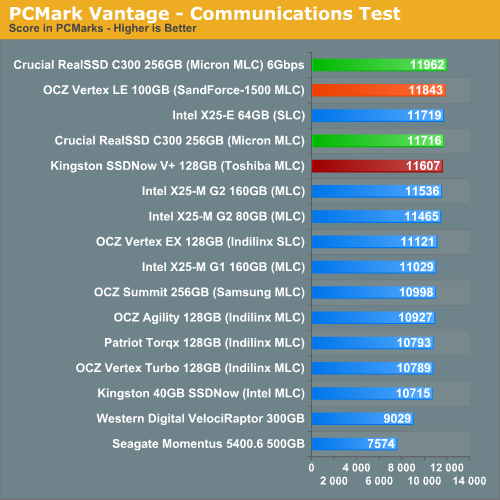
I love PCMark's Productivity test; in this test there are four tasks going on at once, searching through Windows contacts, searching through Windows Mail, browsing multiple webpages in IE7 and loading applications. This is as real world of a scenario as you get and it happens to be representative of one of the most frustrating HDD usage models - trying to do multiple things at once. There's nothing more annoying than trying to launch a simple application while you're doing other things in the background and have the load take forever.
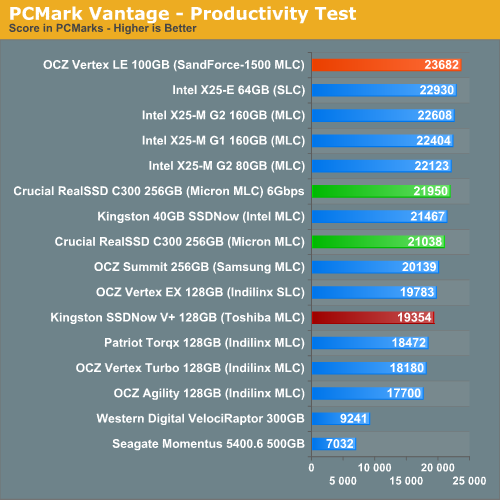
There's just no replacement for IOPS, and the Vertex LE has ample to spare. This is one of the only cases in PCMark Vantage where the SandForce-1500 based drive pulls clearly ahead of the C300.
The final PCMark Vantage suite is HDD specific and this is where you'll see the biggest differences between the drives:
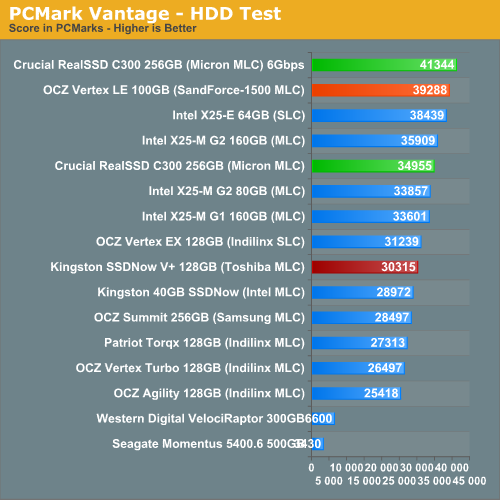
The HDD test is purely I/O bound and connected to a 3Gbps controller, the Vertex LE is clearly the fastest thing here. Around 9% faster than Intel's X25-M or Crucial's RealSSD C300. Pair the C300 with a 6Gbps controller however and it's the unequivocal performance leader. If you have a motherboard with 6Gbps SATA on-board, this is the SSD you'll want.










83 Comments
View All Comments
AnnonymousCoward - Sunday, February 21, 2010 - link
> Zoomer: The point of SSDs is to improve the user> response time.
Exactly! So why don't we compare response times?
> erple2: Saying that one drive attains 600 IOPS on
> "Anand's light StorageBench" where another
> attains 500 IOPS _ON THE SAME BENCHMARK_ does, in
> fact, give you a reasonably accurate comparison.
Sorry, not true. Like I said, SandForce's compression makes IOPS not equal to bandwidth. See http://tinyurl.com/yden7kc">http://tinyurl.com/yden7kc . And allow me to restate my comments from the last article: In article http://tinyurl.com/yamfwmg">http://tinyurl.com/yamfwmg , in IOPS, RAID0 was 20-38% faster! Then the loading *time* comparison had RAID0 giving equal and slightly worse performance! Anand concluded, "Bottom line: RAID-0 arrays will win you just about any benchmark, but they'll deliver virtually nothing more than that for real world desktop performance."
So there you have it. Why measure IOPS?
> erple2: what is important is the general ranking
> of these devices in the same benchmark. The
> benchmark is measuring the _relative_ performance
> of each of the drives in the same sequence of
> tests.
What "general ranking" lacks is the issue of significance. I apologize, but I will again restate what I posted on the last article: is the performance difference between drives significant or insignificant? Does the SandForce cost twice as much as the others and launch applications just 0.2s faster? Let's say I currently don't own an SSD: I would sure like to know that an HDD takes 15s at some task, whereas the Vertex takes 7.1s, the Intel takes 7.0s, and the SF takes 6.9! Then my purchase decision would be entirely based on price! The current benchmarks leave me in the dark regarding this.
jimhsu - Saturday, February 20, 2010 - link
The performance/free space dropoff is a significant issues, especially with otherwise-fast SSDs (i.e. Intel). For example, the 80GB X25-M should really be relabeled as a 60GB drive due to progressive worsening performance as the amount of free space decreases (beyond 70GB, it starts getting REALLY bad). Do these drives show any improvement in the performance to free space degradation curve?Demon-Xanth - Saturday, February 20, 2010 - link
Given the state of so many SSDs out there using so many controllers with the performance being so dependent on the controllers......if is possible to get "summary" chart of what drives use what controller configurations?
yottabit - Saturday, February 20, 2010 - link
Thought I would point out that Page 8's title lists "Apricon" instead of "Apricorn"As always, thanks for great articles Anand!
aarste - Saturday, February 20, 2010 - link
I'm building a new PC soon and was going to buy another Agility 60 and use it with my existing 60gb agility and raid0 them up. But since the Intel X25-M 80GB is almost the same price, and blows away the agility in random reads (which is more relevant in OS/App usage than sequential speed, correct?) would it be better just to buy and run the single Intel drive instead?I'm not too fussed about losing out on 120gb of capacity in raid0, and besides, I can install the games to the Agility instead, and use the Intel for the OS/Apps.
leexgx - Saturday, February 20, 2010 - link
No TRIM support in RAID so the drives would end up like 1 or less SSD speeds, SSDs really tank in speed once the drive has to erase before Write (Filled State)need to use Standard AHCI drivers (install win7 but do not install chipset drivers or Intel matrix drivers as that would disable TRIM)
1 intel SSD 80gb and the Agility 60GB with updated Firmware one you got now is the best option
(correct about random reads and Writes the intel one hardly drops in speed at random Writes at all, most get to Focused on sequential speeds, as long as TRIM support is there)
cjcoats - Saturday, February 20, 2010 - link
The one thing missing is the one that's really relevant to me: workstation performance.It's probably close to the "heavy load" scenario", but... For me, it's a mix of compiles, compute-intensive modeling, visualization, and GIS use. Of these, the compiles, the visualization, and the GIS are the really-interactive items, so are probably most important.
There are lots of compile-benchmarks out there; it would be relatively easy to generate a GIS benchmark, using some of the GRASS GIS logs I have from what I've been doing lately.
FWIW.
NeBlackCat - Tuesday, February 23, 2010 - link
I completely agree that there should be a developers benchmark, and keep mentioning this when these articles appear.Compiling a large software project seems to me to be a good general purpose test. There'll be random and sequential reads and writes, of a few bytes to many megabytes, in some hard to predict ratio, as the build process reads sources/headers, uses temporary files and writes output. It isn't obvious to me whether the Intel or the Indilinx/Micron characteristics would be favored.
But afaik no-one's studied this from an SSD angle, and I wish Anand would at least add a benchmark which could, say, build a Linux distro while grepping it repeatedly for some random text.
What say you Anand?
OfficeITGeek - Saturday, February 20, 2010 - link
Anand,As always another great article. I just wanted to say that it is looking really bright for SSD's. The performance benefits of SSD's are just to great to ignore (unlike the switch from DDR2 to DDR3). But I am going to hold off though until Q4 as by then, the market will have alot more competition (hence lower prices), bugs will be sorted out and the thought of dead drives (such as the one you experienced) just gives me the creeps even if they do replace it with a new one.
MadMan007 - Saturday, February 20, 2010 - link
Anand, it is getting hard to keep track of different SSDs, which controller they use, how many flash chips, etc. It would be wonderful if you could start an 'SSD decoder ring' chart that lists the relevant information, maybe even linked to performance numbers like you've done with CPUs.